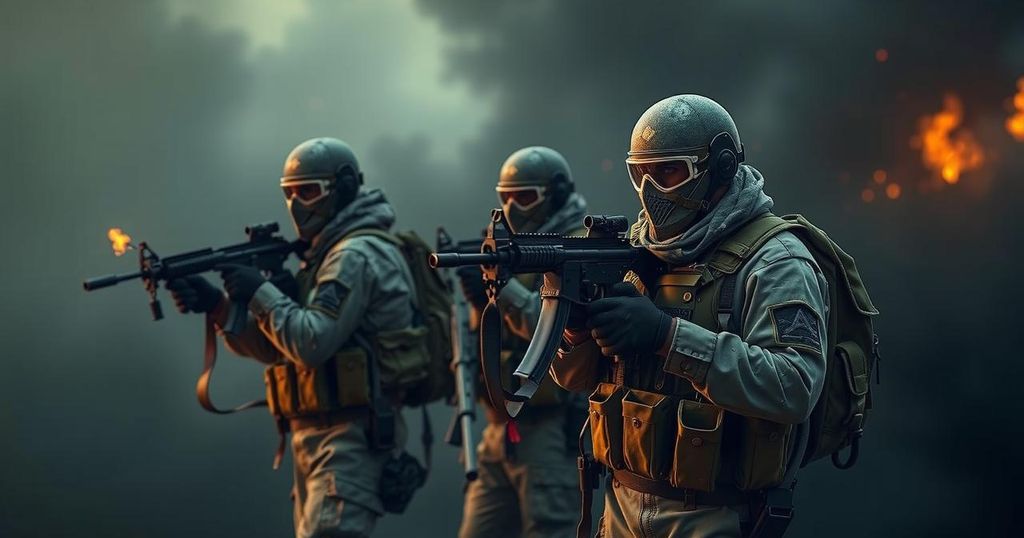The Syrian civil war intensifies as Iranian-backed militias vow to assist Assad’s forces amid a significant insurgent offensive led by Hayat Tahrir al-Sham. The offensive has successfully seized parts of Aleppo, complicating regional tensions involving Israel and Iran. Nujaba Movement spokespeople denote U.S. involvement in stirring conflict, while Israeli airstrikes hint at military dynamics emerging during this escalating conflict. The situation continues to evolve with potential implications for regional stability and global interests.
Recent developments in Syria’s civil conflict indicate a significant escalation as an Iranian-affiliated Iraqi militia, the Nujaba Movement, has expressed its support for Bashar al-Assad’s forces against a new surge of insurgent attacks. These recently launched offensives, labeled “Deterrence of Aggression” and “Dawn of Freedom,” have been spearheaded by Hayat Tahrir al-Sham and allied groups. Their rapid advance has resulted in the capture of parts of Aleppo, with momentum potentially shifting toward Hama. The fallout of this situation is further complicated by concurrent regional tensions, particularly the conflict involving Israel and the Iran-led Axis of Resistance since the unexpected assault by Hamas.
Moreover, the Nujaba Movement’s spokesperson, Hussein al-Musawi, criticized the offensive as a stratagem devised by the United States and Israel to weaken the Iran-aligned coalition, asserting that the insurgencies operate under U.S. direction with the intent to exacerbate regional instability. This aligns with the broader context of the ongoing engagements between various militant groups in the region. Amid these developments, Israel has conducted intelligence strikes on Hezbollah infrastructure, which potentially indicates a growing intertwining of Syrian and Israeli military interests.
As diplomatic negotiations involving Iran, Turkey, and Russia intensify, the dynamics within Syria remain delicate. The U.S.-backed Syrian Democratic Forces (SDF) have also indicated their vigilance regarding these developments, accusing Turkey of orchestrating the insurgent attacks and affirming their readiness to intervene to protect their territories in northern Syria.
The ongoing Syrian civil war has entered a new phase with the involvement of both regional powers and various insurgent groups. This shift comes as larger geopolitical conflicts unfold, particularly focusing on the relationships between Israel, Iran, and militant factions operating within Syria. The emergence of the Nujaba Movement highlights cooperation among Iranian-backed forces across borders, indicating a unified stance against perceived threats from the U.S. and Israel. The backdrop of this conflict also encompasses historical grievances, local rivalries, and the complex interplay of international interests attempting to influence outcomes in the region. This environment complicates efforts towards peace and stability as multiple factions vie for control and influence. The Syrian Democratic Forces’ response indicates an awareness of the shifting loyalty alignments and the intricate web of local and foreign interests impacting the region’s security dynamics. With numerous stakeholders involved, including Syrian governmental forces, Kurdish groups, and proxy militias from neighboring states, the potential for further escalation remains high, while the prospect of de-escalation appears tenuous at best.
In summary, the escalating conflict in Syria signifies a crucial point as Iranian-backed Iraqi militias pledge support to Assad amidst significant insurgent offensives. The operation led by Hayat Tahrir al-Sham marks a notable shift in territorial control, while the geopolitical scene remains affected by concurrent tensions involving Israel and its opponents. Diplomatic efforts are ongoing, although local factions express readiness for confrontation as they navigate an increasingly complex amalgam of national and regional interests. The situation remains fluid, with potential for both escalated conflict and shifts in alliances affecting all stakeholders involved. The international community’s response to these developments, especially that of the United States, is also being keenly observed.
Original Source: www.newsweek.com






